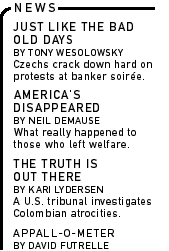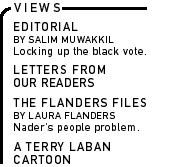
|

|

|

|
| |
|
|
|
Ralph Nader has a problem, except it's not really his problem. It's ours. Nader says he's running for president on the Green Party ticket to reinvigorate U.S. politics. It's about building a people's movement, he says. The only snag: When it comes to people of color, queers, feminists and a whole hunk of today's already pretty invigorated youth movement, Nader and the people find it hard to get along. During his September spin through California, Nader was told off by the National Organization for Women, the (gay and lesbian) Human Rights Campaign, and nine business-oriented people-of-color groups who complained that Nader had marginalized their issues and failed to organize in inclusive ways. NOW President Patricia Ireland called Nader "ill-informed about abortion-rights" and noted that his 10-page mission statement did not mention any explicitly feminist issues: not birth control, not abortion, not violence against women. Later, speaking on Radioforchange, Ireland claimed that her criticisms had been overplayed. She wasn't "lashing out" as the San Francisco Chronicle put it. She was just "pushing or pulling Nader to be better on women's concerns" in the same way he's "pushing" Al Gore to listen to the left. Nader was having none of it. Clearly annoyed, he bit back: "I've been fighting for women's rights since before Patricia Ireland knew the term." Referring to NOW's concern that votes denied Gore might result in a slew of Republican picks on the Supreme Court, Nader accused his critics of reverting to "the politics of fear." "It's time for the constituency groups of the Democratic Party to hold that party up to a higher standard," he said, "instead of crawling on their knees to an endorsement because they believe Republicans are worse." The last weeks of a tight campaign are no time to get Nader's ear. With the race between Bush and Gore too close to call in California, it was easy for his defenders to join him in trashing his critics for acting like tools of the Democratic National Committee. But if Nader is out to build a movement, he can't just dismiss what he calls "constituency groups" and lecture them about seeing things his way. "Although the most emotionally outrageous things come from racial issues, we have to connect them to the larger picture of class," he told a group of minority leaders in Milwaukee. "It would be a mistake if we concentrate just on race and not class." Maybe, but Nader is in zero danger of making that mistake. By journalist Ruth Conniff's account, there were three black faces in the Green Party convention hall in Denver. In Los Angeles, at the protest around the Democratic convention, where the crowd was irrepressibly young, articulate and not white, the Greens stood out as the one lily-white cluster in every line-up. And the big Green banners and Nader puppets were noticeably absent from some key events: the protest outside the LAPD police headquarters and the march against the criminalization of immigrants and youth, for example. Airing this discussion on Radioforchange, I've heard from defensive local Greens who say they recognize the problem. In an effort to broaden their campaign's appeal, party members in Denver are observed S26--a day of international action around globalization--by teaming up with Jobs with Justice in a Justice for Janitors rally. In California, Green Senate candidate Medea Benjamin is touring state campuses and Latino communities, where she's known for her work against sweatshops. She says "diversifying the party" is the No. 1 priority. But it makes life hard for these local party folks, when the top of the ticket seems quite content to run with an all-white male crowd. On his "Non-Voter Tour," Nader's headliners are Michael Moore, Howard Zinn, John Anderson and Jim Hightower. His running mate, American Indian feminist (and Harvard scholar) Winona LaDuke, has been away for much of the campaign, touring with the Indigo Girls to raise funds for her organization, Honor the Earth. I'm not calling for "inclusion" Republican-style: line lots of colored folks up and wax lyrical about "us." Nader likes to say his campaign is about ideas, not emotions--well, talking about gender and class is talking about ideas. Look beyond the "emotional outrage" of bigotry, Nader says, to see the "larger picture" of class. That's where he loses us feminists and anti-racists. Race and gender discrimination aren't "emotionally outrageous." They are pillars on which capitalism stands. Unpaid work by women and life-destroying work by people whose lives are socially devalued make possible the corporate profits-for-a-few that Nader attacks. I long to vote for a viable left alternative. I'll do it, for the Greens, most likely, just to make visible the existence of a defiant left. But the people I love in the non-white activist movement won't be coming along. I've not heard one say anything good about Nader. In the words of my friend Peter Chung, a leader in New York's youth action group SLAM, "I've met the Greens and they're all white." I know the theory is that if the Green Party can win those federal
matching funds, they'll really get to take off after November 8,
but I fear the ballot box is no place to found a movement. You can't
build a people's movement without the people.
|

